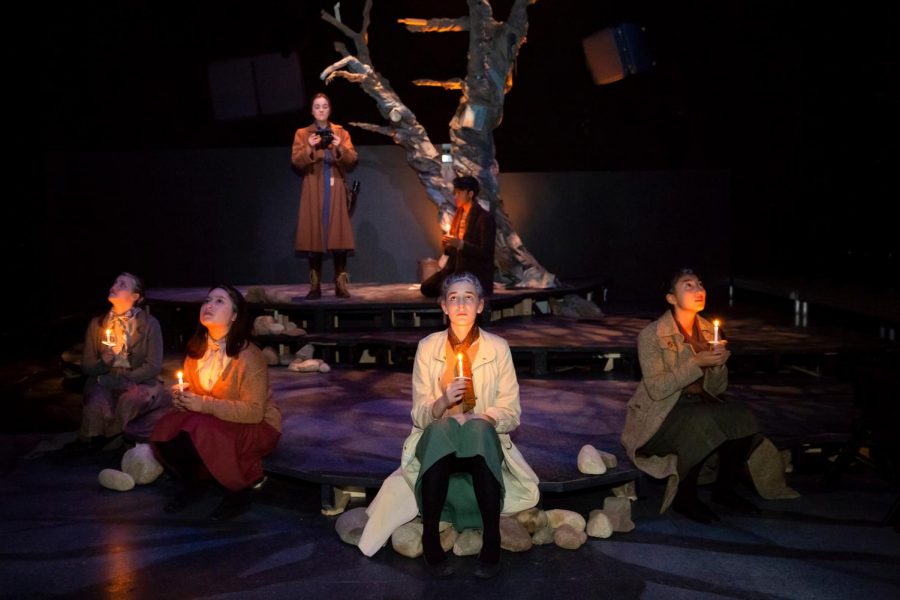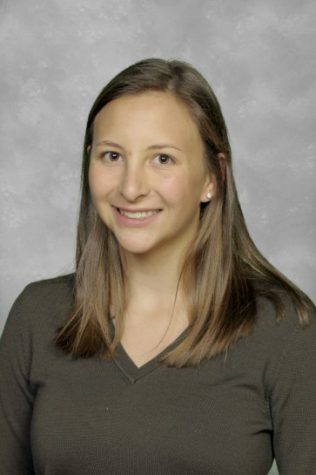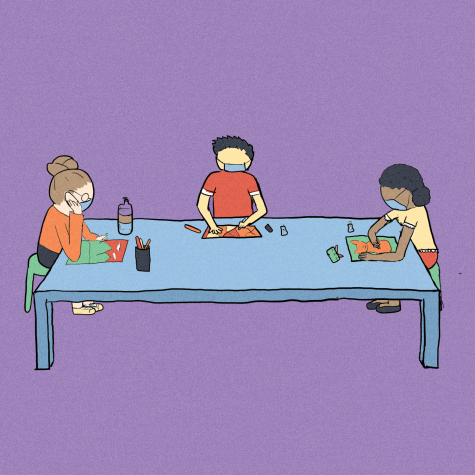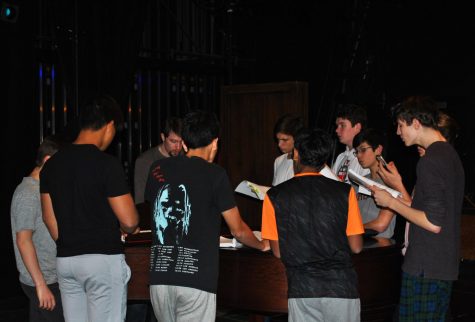Tragedy, Love in “The Women of Lockerbie”
In the aftermath of Pan Am 103’s fatal flight over the hills of Lockerbie, Scotland, a mother from New Jersey looks for the remains of her son. Also scavenging the plane’s wreckage are the women of Lockerbie. While the mother grieves, these women fight the United States government and strive to rescue the clothing of the victims to return them to their families. Inspired by a Greek tragedy, Deborah Brevoort’s play concerns a fundamental transformation of an act of terror into an act of love.
Chosen by Laurie Sales to “excite, inspire and challenge” the Groton community, “The Women of Lockerbie” was brought to the stage by a group of dedicated actors and actresses. Though initially Laurie had thought of taking on Antigone, a Greek drama, she decided instead to direct a play “that tackled the emotional impact of the Greeks.” She was reminded of “The Women of Lockerbie.”
The cast, including both returning and first-time actors and actresses, gave a spectacular performance. On the stage at Groton for the last time, Josie Fulton ‘18 played Madeline Livingston, the grieving American mother who lost her son in the crash. Julien Alam ‘19, who played her husband Bill Livingston, returned to the stage for the third time this year after his performances in as Malvolio and the Emcee in Twelfth Night and Cabaret, respectively. Another theater veteran, Christian Carson ‘18, portrayed George Jones, an American government worker who keeps the women from rescuing the victims clothing. Finally, Angelika Hillios’ 19, Amy Lu ‘19, Lucy Chatfield ‘18, Claire Holding ’21, Katherine Johnson ‘20 and Eliza Powers ‘20 took the stage as the titular women of Lockerbie – “the embodiment of girl power,” according to Amy.
Two other seniors, James Hovet ‘18 and Brianna Calareso ‘18, were the lighting designer and stage manager of the play, respectively. Finally, accompanying Laurie in putting this show on the stage, Dashy Rodriguez ‘19 served as the assistant director and Rose Gil ‘18 as the assistant stage manager.
“The thirteen students involved in the day to day production and rehearsal process are diverse, smart, generous and curious,” Laurie notes. Though she says the final product was brilliant, it’s the “the lengthy open-hearted conversations with the cast about faith, fate, loss, love and hatred” that have made this experience memorable for Laurie. “The students found more in the text than I could have dreamed,” she added. Claire agrees: “‘Lockerbie’ has not just been about putting on a show; we have had to contemplate tragedy and hatred”.
But there were unique challenge in staging a Greek tragedy. In the playwright’s notes, Ms. Brevoort cautions actors against method acting, a technique in which actors try to wholly identify emotionally with their characters. Laurie agrees: “…the hardest part is to get the students to hold back on the emoting that the play seems to call for,” says Laurie. “Actors love emotion, but showing emotion on stage robs the audience of its own emotional journey”.
So, what made this performance of “The Women of Lockerbie” different? The intimacy of the experience, for one thing. Unlike the usual Groton performance, this play took place in the Black Box. The smaller space and closer proximity to actors created an “eye-opening experience” for the audience, says Claire. “The aisle seating arrangement [i.e. one in which chairs are placed on two sides of the theater] means that people can see the show from all around and gain a more holistic experience.”
Amy Lu ‘19, however, mentioned the difficulty of working in this space. “Having to play like we’re outside roaming the Scottish hills in a dark enclosed space presented difficulty, and it wasn’t until we had one rehearsal outside that we realized how much we had to expand our scope,” Amy says.
From this magnificent drama, Laurie hopes the Groton community gained perspective “on how we are so tiny in the grand scheme of things” and at the same time appreciate that “each of us is an ocean of joy, and pain, and potential love and hatred.”






